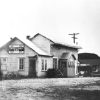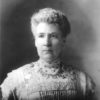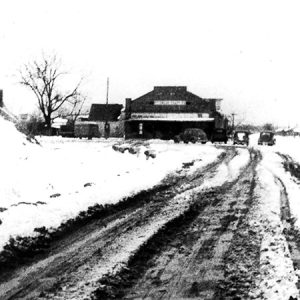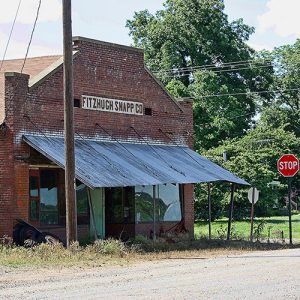calsfoundation@cals.org
Fitzhugh Snapp Company
Located six miles north of Augusta (Woodruff County) at the junction of County Roads 140 and 165, the Fitzhugh Snapp Company at Fitzhugh (Woodruff County) was placed on the National Register of Historic Places in 2005 for its significance in two areas of merit: the general store’s important association with agriculture in Woodruff County and the building’s distinctive representation of twentieth-century commercial architecture. The Fitzhugh store was an integral part of an agricultural community that revolved around cotton production in the northeastern Arkansas Delta from the mid-nineteenth century to the mid-twentieth century.
Rufus K. Fitzhugh and J. Harrison Snapp built the original wooden mercantile store in Fitzhugh, probably in the mid-to-late 1890s. Although its exact date of construction is not known, an 1892–93 edition of the Arkansas gazetteer and business directory lists neither the community nor a store, but the Fitzhugh and Henderson general store is listed in an 1898–99 directory.
In 1935, a new store, the Fitzhugh Snapp Company, was built at the same location to replace the old wooden building that was then moved 100 feet to the southwest and used to store farm chemicals. The old store building was later destroyed.
The Fitzhugh Snapp Company store is a simple one-story red brick building with a symmetrical brick façade. Vertical projections at the top of each front corner rise to a wide middle cornice with a line of dentil brickwork beneath. Brick detailing encompasses a centered masonry block sign with the letters “FITZHUGH SNAPP CO” over a metal canopy suspended by metal cables attached to the brick above. Beneath the canopy, which extends across the storefront, is a recessed entry with a center doorway flanked by large glass display windows. Behind the building’s distinctive façade is a gabled roof that extends to the rear of the building.
Providing groceries and dry goods for area farming families, the general mercantile store also stocked hardware and fertilizer. Farmers ate lunch there, and their families walked there for their groceries and mail, as the store also housed the post office.
Rufus K. Fitzhugh was its first postmaster, named to the position in 1896. The son of Rufus K. Fitzhugh Sr., who came to the area from Virginia prior to the Civil War, he acquired large tracts of land suitable for growing cotton, corn, and other crops. Attracted to the possibilities of farming the area’s rich soil, Fitzhugh had studied at the Agricultural and Mechanical College at Auburn, Alabama (now Auburn University). Before the turn of the century, he owned 800 acres of land with 600 under cultivation.
He formed a cotton-farming cooperative with J. Harrison Snapp and John G. Haralson, who were other large planters at Fitzhugh. By 1933, the association owned 4,000 acres of cotton land spread over six square miles and, in addition to running the Fitzhugh store and a cotton gin, provided accredited schools with bus service for their farm tenants. Through innovative self-help and goodwill programs instituted by the landowners, tenant farmers could own livestock and undertake efforts that benefited both landlord and tenant alike.
The Fitzhugh Snapp store closed in 1981. It was later acquired by a private individual and used as a farm implement repair shop. By the start of the twenty-first century, the production of cotton at Fitzhugh—once so important to the South’s economy—had been replaced by the farming of other crops, including rice, soybeans, corn, grain sorghum, and wheat.
For additional information:
Allen, Desmond Walls. R. L. Polk’s Arkansas State Gazetteer and Business Directory, 1898–1899. Conway, AR: Arkansas Research, 2008.
Brandon, C. C. “Fitzhugh Citizens: From the Arkansas Central Leader, October 27, 1927.” Rivers and Roads and Points in Between 34 (2010): 82.
“Fitzhugh Snapp Company.” National Register of Historic Places nomination form. On file at Arkansas Historic Preservation Program, Little Rock, Arkansas. Online at http://www.arkansaspreservation.com/National-Register-Listings/PDF/WO0052.nr.pdf (accessed September 16, 2021).
Wallace, Michelle. “Historic Building in Fitzhugh Is Symbol of Agricultural Success.” Arkansas Democrat-Gazette, February 26, 2006, p. 3S.
Diane H. Norton
Snowmass Village, Colorado
 Cotton Gins
Cotton Gins Early Twentieth Century, 1901 through 1940
Early Twentieth Century, 1901 through 1940 Historic Preservation
Historic Preservation Fitzhugh
Fitzhugh  Fitzhugh Snapp Company
Fitzhugh Snapp Company 




Comments
No comments on this entry yet.